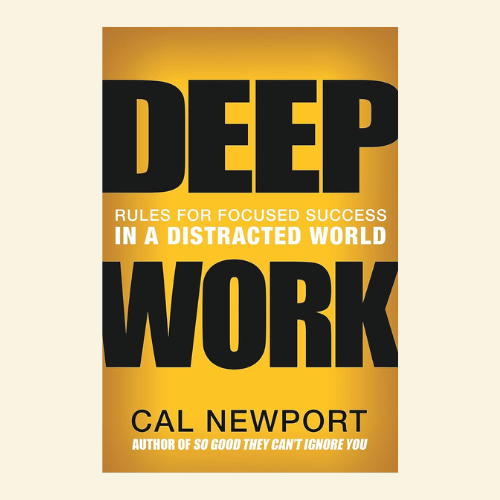Introduction
Deep Work is a rare but powerful skill that allows individuals to focus intensely, eliminate distractions, and produce high-quality work. However, most people struggle to concentrate for extended periods, constantly pulled away by emails, notifications, and endless to-do lists. This constant fragmentation of attention leads to reduced productivity, slower learning, and unfinished projects.
In contrast, those who practice Deep Work can achieve remarkable results by dedicating uninterrupted time to meaningful tasks. Whether you’re a professional, student, or entrepreneur, your ability to engage in sustained, distraction-free work is what sets you apart.
The concept, introduced by Cal Newport, provides a structured approach to train your mind for deep concentration. Instead of reacting to distractions, Deep Work helps you cultivate mental discipline, improve efficiency, and develop the ability to work at an elite level.
In this article, we’ll explore:
- What Deep Work is and why it’s essential for success.
- The key benefits of Deep Work and how it enhances your brainpower.
- Proven strategies to implement Deep Work in daily life.
- Practical techniques to eliminate distractions and master focus.
If you often feel busy but struggle to make meaningful progress, Deep Work might be the missing piece. Let’s break down its principles, benefits, and strategies to help you work smarter and achieve more.
Understanding Deep Work
Deep Work is the practice of dedicating time and mental energy to tasks that demand intense concentration. These tasks typically yield significant results and cannot be performed effectively amid continuous interruptions. Unlike casual multitasking, Deep Work elevates an individual’s cognitive capacity, granting access to deeper levels of reasoning and problem-solving.
The core premise of Deep Work rests on the belief that valuable tasks deserve undivided attention. Instead of scattering effort across countless minor responsibilities, a Deep Work mindset underscores the importance of dedicating blocks of uninterrupted time to a single objective. The outcome includes stronger neural connections, higher-quality work, and an expanded skill set in one’s field.
Shallow tasks—those that are simple and quickly handled—often dominate a typical day. Checking social media, responding to multiple emails, and constant context switching deplete mental reserves, leaving limited space for meaningful output. By contrast, Deep Work tasks foster intellectual development and creative breakthroughs.
One reason Deep Work is so powerful stems from how the human brain forms and refines neural pathways. When you devote continuous attention to a specific challenge, your mind establishes robust patterns of thinking that facilitate learning. People who follow a Deep Work practice habitually report a sharper intellect, quicker problem-solving skills, and a more substantial creative spark.
Embracing Deep Work involves understanding the nature of your tasks, determining which ones matter most, and eliminating the clutter that thwarts progress. The upcoming sections provide an in-depth exploration of its extensive benefits, proven methods for structuring time, and a blueprint for reducing distractions effectively. By integrating these strategies, you can cultivate a disciplined mindset that consistently powers real progress.
Deep Work principles do not call for superhuman effort. Instead, they require deliberate scheduling, clear objectives, and a willingness to resist modern distractions. Each step in your journey toward mental clarity builds a foundation for profound achievements. The next part of this article elaborates on the remarkable benefits you can enjoy when making Deep Work a core element of your daily routine.
The Remarkable Benefits of Deep Work

Pursuing Deep Work can transform how you produce and learn. When attention remains undivided, energy channels into a single task, providing fertile ground for skill mastery and innovative thinking. Below are some of the most notable advantages:
- Enhanced Focus and Cognitive Performance:
Directing your attention exclusively toward one objective strengthens your brain’s capacity to process information. The mind enters a state of flow, minimizing fatigue while expanding your intellectual reach. Individuals who adopt Deep Work find they can tackle complex problems with greater agility. - Accelerated Skill Acquisition:
Consistency in challenging yourself fosters robust neural connections. Whenever you immerse yourself in a demanding project for an extended period, your brain is more likely to retain insights. This intensity leads to faster learning, helping you stay ahead of the curve in competitive environments. - Creative and Efficient Output:
Deep Work significantly increases the likelihood of finding creative solutions. Substantial creativity often emerges when the mind is fully engaged with a topic for an extended block of time. By avoiding fragmented attention, each session can yield fresh perspectives and breakthroughs. - Reduced Stress and Heightened Satisfaction:
Distractions fragment focus and raise stress levels. Constantly jumping between tasks leads to mental strain. In contrast, a Deep Work session provides clarity, bringing a sense of calm and satisfaction. Progress on meaningful tasks fosters accomplishment, relieving the discomfort that accompanies unfinished priorities.
As you invest in Deep Work, your capacity for concentration, learning, and quality output multiplies. Imagine completing core tasks in a fraction of the time while enjoying a clear mind. Not only does your productivity rise, but you also discover renewed enthusiasm for work that once seemed daunting. The deeper sense of purpose generated by these focused sessions can permeate other aspects of life, boosting confidence and resilience.
Deep Work also aligns with the broader pursuit of personal development. Instead of seeking shortcuts, you immerse yourself in the intricacies of the task at hand. This method transforms each challenge into an opportunity for growth. Over time, this accumulated effort propels you forward faster than scattering energy in multiple shallow directions. The next section outlines critical disciplines that underscore the Deep Work philosophy, showing how to reinforce the practice for optimal results.
The Four Disciplines of Deep Work
A structured method makes it easier to implement Deep Work effectively. The following four disciplines create a foundation that fosters deep concentration, minimizes distractions, and drives consistent results:
- Work Deeply:
Prioritize tasks requiring undivided attention. When you choose to work deeply, schedule definite time blocks in a calm environment. Communicate boundaries to colleagues or family members, ensuring you remain uninterrupted. By safeguarding these sessions, you allow your mind to enter a flow state. - Embrace Boredom:
Modern life is brimming with distractions. Embracing boredom involves resisting the urge to switch tasks or seek immediate amusement during downtimes. Aim to train your mental muscles so they remain strong under low-stimulus conditions, enabling you to maintain deep concentration when tackling complex tasks. - Quit Social Media:
Social networks and endless scrolling cultivate shallow habits. While it may not be feasible to cut out every online activity, consider imposing strict limitations. For instance, you might designate a short window each day for social media. By removing this digital clutter, your mind retains the bandwidth for substantive challenges, aligning perfectly with Deep Work goals. - Drain the Shallow Work:
Shallow tasks—quick emails, administrative duties, trivial tasks—often feel urgent but seldom bring high-impact results. The discipline of draining shallow work means eliminating, delegating, or batching these tasks so they don’t overshadow important objectives. Strive to handle them efficiently, freeing cognitive energy for the real work.
Applying these four principles encourages you to cultivate an environment supportive of Deep Work. If deep focus is a priority, you can’t treat it like an afterthought. Ensuring time for distraction-free sessions signals to your brain that your intellectual pursuits matter. Similarly, learning to handle boredom gracefully yields resilience against quick, shallow impulses. Meanwhile, restricting social media use and batching trivial tasks can open vast mental space, laying the groundwork for a deeply creative mindset.
The essence of these disciplines lies in deliberate effort, not half-hearted attempts. Every time you prioritize a demanding task, you strengthen neural circuits responsible for memory, reasoning, and comprehension. Gradually, it becomes easier to drop into deeply focused states. The upcoming section dives into the practical steps required to build a Deep Work routine, offering a roadmap you can tailor to your unique schedule and goals.
Building a Sustainable Deep Work Routine
Constructing a workable routine for Deep Work involves balancing personal preferences, professional obligations, and the realities of life. No one-size-fits-all blueprint exists, but fundamental guidelines ensure each session maximizes productivity and creative potential. Consider the following elements:
- Define Your Deep Work Strategy:
Different people thrive under various approaches. Some prefer a monastic routine, dedicating large chunks of time every day. Others favor a bimodal strategy, where they split their schedule between extended retreats of focused time and days devoted to simpler tasks. The rhythmic method involves reserving the same hours each day for deep concentration, while the journalistic approach inserts deep sessions whenever a slot appears. Pick the strategy that complements your commitments. - Eliminate Distractions:
Deep Work flourishes in an environment free of tempting lures. Turn off unnecessary notifications, close irrelevant tabs, and choose a quiet space if possible. Headphones or background music can help maintain concentration, though they may not suit everyone. The goal is to reduce mental overhead caused by external interruptions, enabling extended periods of elevated cognition. - Set Clear Time Blocks:
Blocking out time is integral. Attempt to plan at least one or two-hour sessions for Deep Work on days when you must produce high-value results. By pre-committing to these slots, you communicate their importance to yourself and others. Protect these windows, and do not schedule less-critical activities during them. - Train Your Brain for Deeper Focus:
Practicing brief periods of intense concentration can sharpen your mental faculties. For instance, try the Pomodoro Technique with an extended focus interval—such as 45 minutes—followed by a short break. Over time, gradually lengthen these intervals. The more you challenge your mind to remain present, the stronger your concentration will become.
Routine formation is a deliberate process. At first, you might find it challenging to stay focused for extended periods. The pull of social media or the urge to jump to another task may loom. But consistent practice rewires your brain to handle complex information more comfortably. Progress is often incremental, so be patient and refine your approach based on daily experiences.
Daily reflection can be immensely valuable. After completing a Deep Work session, briefly note what went well and what disrupted your focus. Did you struggle with any specific distractions? Did certain times of day yield better performance? Over time, these observations help you optimize your routine.
In essence, a well-crafted routine evolves alongside your needs, ensuring that each step you take is purposeful. By combining strategy, distraction management, time blocking, and mental conditioning, you pave the way for continuous improvement. Next, we turn to practical suggestions for eliminating everyday disruptions that threaten to sabotage even the most well-planned routine.
Practical Tips to Eliminate Distractions

Nothing derails Deep Work faster than constant disruptions. Email pings, social media feeds, and office chatter can break your concentration, forcing you to restart the momentum cycle. Fortunately, several tried-and-tested strategies can keep distractions at bay:
- Create a Focus-Friendly Workspace:
If possible, dedicate a particular spot to your Deep Work sessions. Keep this area free from clutter and equip it with the tools required to complete tasks efficiently. When you repeatedly use the same location for profound focus, you train your brain to shift into that mode more quickly. - Limit Checking Communication Channels:
Frequent email and chat checks fragment attention. Instead, set intervals throughout the day for these tasks. Let colleagues or clients know you only respond at specific times. This minor change can dramatically elevate concentration levels. - Use Website Blocking Tools:
Tools and browser extensions can block time-wasting websites during scheduled Deep Work blocks. By placing these digital barriers, you remove the option of self-interruption. Even a short break to scroll a newsfeed can break your flow, so strong preventative measures can be invaluable. - Implement a Distraction Journal:
Each time you feel an urge to check your phone or hop online, note down the trigger. After several days, patterns emerge, pointing to times or circumstances when your focus wavers. Armed with this information, you can strategize to avoid or counteract these triggers.
Adopting an experimental mindset helps find the perfect balance. Some individuals might need noise-cancelling headphones, while others might require an app that locks their phone for a specified duration. The objective is consistent: minimize opportunities for shallow behaviors to intrude. Remember, even the slightest diversion can reset your train of thought, forcing you to spend valuable mental energy regaining momentum.
Combining a distraction-free zone, time-bound communication check-ins, and a purposeful approach to technology fosters a supportive ecosystem for Deep Work. Persistence is key; it may take time to refine a system that seamlessly fits your lifestyle. When integrated with a robust routine, these practical tips cultivate an environment where sustained focus is the default, not the exception.
Conclusion
Mastering Deep Work can completely transform how you work, learn, and grow. By eliminating distractions and training your mind to focus deeply, you gain the ability to produce high-quality work, accelerate learning, and stand out in any field. Every hour of uninterrupted concentration compounds into real progress, giving you an edge over those stuck in shallow, unfocused tasks.
Deep Work requires commitment, consistency, and a structured approach. That’s exactly what Cal Newport’s book, Deep Work, provides. This book is your ultimate guide to mastering deep concentration, eliminating digital noise, and optimizing your productivity.
Ready to Take Control of Your Focus? Get Your Copy Today!
📖 Deep Work isn’t just a productivity book—it’s a game plan for success. If you’re serious about working smarter, achieving more, and eliminating distractions, this is the book you need.

The ability to focus deeply is your greatest asset—start mastering it today! 🚀




